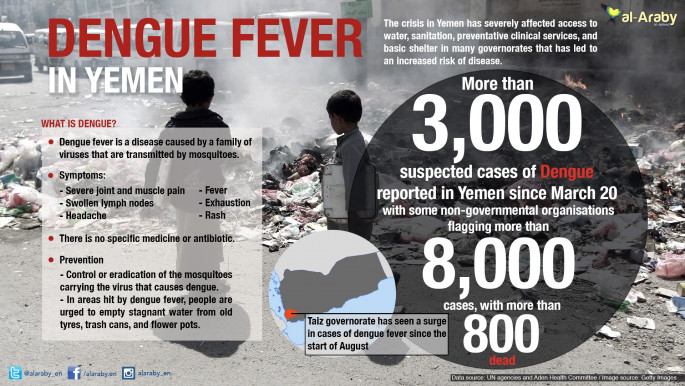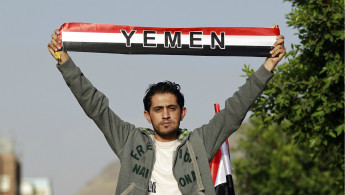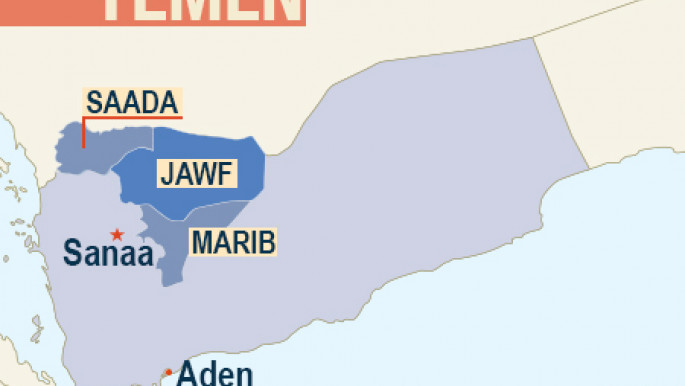Yemen ceasefire possible before November 15, says UN envoy
Al-Araby al-Jadeed: Your recent statements are markedly optimistic, given the hardline positions of the Houthi group. Will the Geneva conference convene on time on November 15?
Ismail Ould Cheikh Ahmed: Yes, we are optimistic this time, based on what we heard from the Yemeni and foreign parties. A delegation from my mission went from Muscat to Riyadh, and met with parties there.
I met with figures from the General Congress Party and Mr Abu Bakr al-Qirbi in Amman last week. There is a lot of optimism and all sides agree on going to a new round of talks.
|
|||||
The reason for optimism is that after the letter President Abed Rabbo Mansour Hadi sent to the UN Secretary-General [agreeing to the resumption of negotiations], we said we did not want to repeat what happened in the last round of Geneva, which had been hastily arranged. We were in a hurry because we wanted to stop the war.
This time, we decided to accomplish during preparations for the next Geneva talks the following: that the discussions would focus on implementing UN resolution 2216, and we have now reached a consensus on this.
Secondly, that the priority of the meeting's agenda as everyone agreed would be a ceasefire. However, the government rejects ceasefire without agreeing on guarantees and a clear programme with regard to the withdrawal and disarmament of militias.
Today, the priority is for confidence-building measures, including releasing prisoners and delivering aid to hard-hit areas such as Taiz... We must also ensure that no violations of Saudi borders occur as part of these measures.
Accordingly, We are very optimistic this time, and all sides remain committed to the process, even the Houthis.
AAAJ: Are there still mutual reservations between the two sides?
IOCA: Both sides still have reservations. In Riyadh, they say that they do not trust the Houthi commitment. In turn, the Houthis believe the legitimate government wants to stall and buy time...
However, this is not true. The delay has nothing to do with Riyadh. Rather, we in the UN said we want to ensure everything is ready and do not want to repeat the experience of the last Geneva round.
At the time, the Houthis brought a delegation of 22 although we had agreed to seven. This time, we agreed for there to be two delegations: One representing the government, and one representing the Houthis and [ousted President Ali Abdullah] Saleh's party.
Until we reach a ceasefire and a clear agreement to withdraw from cities, we cannot expect all these problems to be resolved in one meeting, and we will probably need a series of meetings.
Resolution 2216 stresses the importance of political dialogue. The government is ready for a ceasefire provided previous violations of the truce are not repeated.
One of the items we in the UN are proposing is deploying civilian observers with military experience, rather than peacekeeping forces. The UN Security Council could change its mind with regard to peacekeepers, but so far, the Council is determined not to send peacekeeping forces to Yemen.
'International observers'
| No doubt, the risk is great, so there must be guarantees and political pledges by all sides - Ismail Ould Cheikh Ahmed |
AAAJ: Logistically, would it be possible to implement the idea of deploying civilian observers, given the expansion of the fighting?
IOCA: Yes, it is possible, provided there is political agreement. There are questions about this in Riyadh, but bringing in observers under UN supervision is possible.
For example, if the team comprises mainly Yemenis, whether from the army who did not take part in the war, or military experts who took part in peacekeeping missions in African nations, supplemented by observers from Arab and Muslim nations to avoid kidnapping of foreigners.
No doubt, the risk is great, so there must be guarantees and political pledges by all sides.
AAAJ: Did you propose the idea of civilian observers to the Yemeni parties concerned?
IOCA: Yes, we have. There have been positive reactions to the idea, which must also be proposed to the UN Security Council.
AAAJ: Did the Yemeni government agree for a delegation from Ali Abdullah Saleh's party to participate in the negotiations, after some members recently Abed Rabbo Mansour Hadi as head of the party?
IOCA: The government has agreed for a delegation from Saleh's party to attend. Everyone understands it would be impossible to achieve a ceasefire without the Houthis and Saleh's faction.
AAAJ: What will the future of Ali Abdullah Saleh hold in the post-ceasefire period?
IOCA: At the moment we are only discussing the ceasefire and a start of a political dialogue, and the rest will be left to the next phase, whose rules will be decided by the Yemenis. The question is very premature as there are issues that need to be resolved before discussing the political future of any party.
For example, the Houthis have argued that they cannot lay down their weapons now before a clear government is formed, because there isn't a government that has control on the ground, which is their right.
AAAJ: Does that mean the agenda for the upcoming round of Geneva talks will be limited to finding implementation mechanisms for resolution 2216?
IOCA: Yes, that is our primary goal.
AAAJ: But resolution 2216 has become quite broad and the problems lie in its details.
IOCA: That is correct, because the resolution is a framework of actions and specifying the mechanisms of its implementation remains the most important task. Does anyone expect the Houthis to simply lay down their weapons and go home, for example? There must be assurances and a government that is trusted by everyone.
AAAJ: Do you think that what remains of the Yemeni state and its institutions are capable of receiving the weapons of militias - without those weapons then making their way into the hands of organisations such as al-Qaeda and others?
IOCA: If there was a comprehensive political agreement, this could certainly take place. Any solution that excludes a certain party, whether they were the Houthis or Saleh's party, that solution will be useless. If we want a solution we have to include everyone in the political solution.
AAAJ: Including Russia and Iran?
IOCA: Let us be clear - no non-Yemeni party will be part of the discussions on the table. We have consulted with these countries and to be honest, they have been positive about a peaceful solution.
We are also encouraged by the large level of support we have received from the countries of the Arab coalition, which we have witnessed on our recent visits to Riyadh, Abu Dhabi, Bahrain and Qatar.
In the first round of Geneva talks, we felt that there was no seriousness. However now, the countries that support the warring parties in Yemen support the political dialogue and agree there can be no military solution to the war.
Even the Russians are saying that they will only recognise the government of President Hadi. More importantly, the five permanent members of the UN Security Council support our efforts, which is a unique case compared to the positions of these countries regarding other wars around the world.
There is a feeling today that the legitimate government is being pressured to initiate a ceasefire.
Pressures exist on all parties. All the countries that support the warring parties are applying pressure to reach a peaceful solution.
| _ |
 |
Humanitarian disaster prompts action
| A ceasefire before the commencement of talks would be an important step to build trust - Ismail Ould Cheikh Ahmed |
AAAJ: What is the reason for this shift in your opinion?
IOCA: Firstly, the success of the legitimate government and its return to Aden followed by a full recognition of resolution 2216. In the previous round of Geneva talks, a complete recognition of resolution 2216 did not exist. If we had obtained the seven points from the Houthis and Saleh in Muscat, the last round of Geneva meetings would have been very different.
However, there is another very important factor that has contributed to positively shifting the political position towards reconciling, which is the war itself. The humanitarian situation is catastrophic; 21 million Yemeni need immediate assistance...
Further, 20 million Yemenis do not have access to clean drinking water and there has been a dramatic increase in diseases that did not exist in Yemen. Yemen now has the second highest child malnutrition rate in the world. The parties in Yemen have started to understand that the biggest losers are the Yemeni people.
AAAJ: How would a Saudi-Iranian agreement reflect on Yemen, if it were to take place?
I insist that the main factor in solving our real problems is for a Saudi-Iranian dialogue to take place that is based on their historic neighbourly relations. What took place in Vienna last week regarding Syria is an important step in this context, given there was a direct dialogue between Saudi Arabia and Iran.
AAAJ: You met the Qatari Foreign Minister, Khalid al-Attiyah, on Monday. What could Qatar do to help your efforts?
IOCA: Qatar has been fully supportive of our efforts from the beginning, which was reiterated today by Minister al-Attiyah. What we ask is that Qatar convince the government delegation to come to Geneva without preconditions because it is impossible for resolution 2216 to be implemented by itself. Come with good will, forgiveness and openness.
AAAJ: What other ideas will the UN suggest to the negotiating parties in the next Geneva talks, besides civilian international observers to monitor the ceasefire?
IOCA: We have refrained from preparing a plan because we do not want to impose anything on the parties. This will be part of the deliberations. We have general plans but we want to hear from the parties what they think could and could not be implemented.
What we want in the UN is for resolution 2216 to be implemented in its broad terms, which means a withdrawal from cities, the hand over of weapons to the government, the return of the legitimate government to Yemen, a return to the political process and dialogue and delivery of humanitarian aid. However, the discussion of the details will be on the agenda in the Geneva talks.
AAAJ: Does a ceasefire mean a withdrawal of the Arab troops deployed in some Yemeni areas?
IOCA: This is one of the issues that is up for discussion and which we will leave for Geneva.
AAAJ: Are there indicators that a ceasefire could take place before 15 November?
IOCA: We have heard from the two sides that a ceasefire before the commencement of talks would be an important step to build trust and assist talks. This is what we have heard from all parties.
AAAJ: Do you expect a ceasefire to take place before 15 November?
IOCA: We are making serious efforts to make that happen and to secure the release of prisoners.
AAAJ: Will there be direct face-to-face talks between the two delegations in Geneva?
IOCA: This is what we expect. Both parties have expressed their willingness to engage in direct face-to-face talks.
AAAJ: Why did you not visit Aden when the government of Khaled Bahah was based there for a short while before it had to leave after coming under attack?
IOCA: For purely security reasons - I had planned to visit but our evaluation of the situation concluded that it was impossible to provide the necessary security for such as visit unless we travelled there through a 16-hour boat journey.
AAAJ: With Aden, the temporary capital, witnessing such a security situation, do you as the UN trust that the current government and its institutions are able to operate as the legitimate government?
IOCA: Resolution 2216 recognises the legitimate government and the Houthis and Saleh have accepted the resolution, however it is also true that terrorism has developed in Yemen, which is a reality, and what took place against the government in Aden proves as much.
AAAJ: Could the security situation and the spread of groups such as al-Qaeda and IS present an opportunity to convince the warring parties to end the war because such groups represent a common threat to all the warring parties?
IOCA: This is correct because the real long-term danger to both sides is the spread of extremist groups.
AAAJ: What about the Southern Movement and the issue of secession and its relations to the current war?
IOCA: We do not want this contentious issue to be a main issue at the moment. The issue needs to be discussed but at a later stage, because if it were to be discussed today, it will only further complicate the crisis. The international community is still committed to the unity and sovereignty of Yemen.
Interviewed in Doha by Basheer al-Baker and Ernest Khoury




